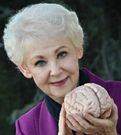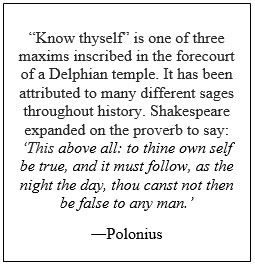Who and Where and Does It Matter?
©Arlene R. Taylor PhD www.arlenetaylor.org
Know thyself…
—Old Greek Proverb
 “I’m nearly 40 years old and I have no idea who I am!” exclaimed the woman across the desk from me. “I know who my spouse is and who my children are, but I don’t know who I am.”
“I’m nearly 40 years old and I have no idea who I am!” exclaimed the woman across the desk from me. “I know who my spouse is and who my children are, but I don’t know who I am.”
“That’s typical of many human beings,” I replied. “Early on, males are often so busy building their careers and doing what they perceive is required to be successful that they rarely take time to figure out who they are innately and what is really important in the big scheme of things. Women, on the other hand, are often quite frenetic—if not frantic—trying to keep everything together for everyone, raising children, caring for house and family members, often working part- or full-time outside the home. You name it.”
Marie nodded. “That pretty much describes me. My parents are growing older, and I see myself caring for them as soon as the children are out of college. Add to that two dogs, a cat, a parakeet, and three goldfish. You know, I really hate changing the water in the fishbowl.” Then she added, “Sometimes I wonder: Is this all there is?”
“You’re right on track with such thoughts,” I said. “By late thirties and early forties, many women look in the mirror one morning and ask similar questions.”
“Furthermore,” said Marie, “I have no idea where I’m really going in life. And then I wonder if who I am and where I am going is really all that important anyway.”
“I believe it is. It certainly has been for me. Let me tell you a little story that I heard some time ago about Billy Graham. I met him and his wife, Ruth, when I was working at a hospital in North Carolina. One of their children had undergone emergency surgery and I was the Recovery Room nurse. I recall thinking how wonderful it would be if I were as tall as Ruth. That was definitely wishful thinking! A well-known American evangelist and spiritual advisor to several presidents, Billy Graham was recognized instantly. Thereafter, I was somewhat interested in news items about him. For example, reportedly he was on Gallup’s list of most admired individuals at least 55 times, more than any other individual to date. And Graham bailed Martin Luther King, Jr., out of jail in the 1960s when King was arrested during Civil Rights demonstrations.”
This is the anecdote I told Marie:
Once upon a time, so the story goes, a group of leaders in Charlotte, North Carolina, invited Billy Graham to attend a luncheon in his honor, him being the State’s favorite son and all. To their surprise, Graham was hesitant to accept, reminding them that he had developed Parkinson’s disease. They encouraged him to attend, however, offering that they did not expect him to preach, just enjoy a lunch given in his honor. He agreed.
After the meal and a great many affirmations said about him, Dr. Graham (he had been awarded an honorary doctorate) stood to respond. According to press reports, this was the gist of Graham’s brief comments.
I'm reminded today of Albert Einstein, the great physicist who has been honored by Time magazine as the Man of the Century. Einstein was once traveling from Princeton on a train when the conductor came down the aisle, punching tickets. When he came to Einstein, Albert reached in his vest pocket, but couldn't find his ticket. Next he checked his trouser pockets. No luck. He looked in his briefcase. Nothing. He checked the seat beside him. Still, no ticket.
The conductor assured the scientist that everyone knew who he was and he himself was certain that Einstein must have purchased a ticket. No worries. Einstein nodded his thanks, and the conductor continued down the aisle punching tickets. Reaching the end of the car, he looked around to see Einstein crawling under the seat, still searching for his ticket. Rushing back, the conductor again assured Dr. Einstein that there was no need to keep looking for the ticket: “I know who you are, and I’m sure you paid for a ticket.”
Einstein looked at him squarely and said, "Young man, I too, know who I am. What I don't know is where I'm going.”
After general laughter, Graham continued. Typically very fastidious in his appearance, Graham revealed that his children and grandchildren had encouraged him to spiff up a bit in his old age. Therefore, he had purchased a new suit for the luncheon and, he expected, for his funeral, as well.
“But when you hear I'm dead,” Dr. Graham said, “I don't care if you remember the suit I'm wearing. Instead, remember this. I not only know who I am. I also know where I'm going."
“I love that story,” said Marie. “I suppose if it was important for him to know who he was and where he was going, it’s important for me, too. I’m just not sure how to start.”
“Brain-function information can help you figure out who you are innately,” I said. “Each brain is gifted in its own way. Learning that for yourself helps you to know yourself and allows you to contribute to life on this planet in a way that works well for your brain. You could begin by taking the assessments on my website. Remember, in the history of this planet there has never been another brain just like yours nor will there ever be—not even if you were an identical twin. If you fail to identify your brain’s giftedness and live in its fullness, you will have deprived the world of what only you can contribute.”
 “I never thought about it in that way,” said Marie. “I read something about the Butterfly phenomenon the other day. How one very small change in initial conditions had created a significantly different outcome. It got me to thinking. That’s the reason I came to see you today.”
“I never thought about it in that way,” said Marie. “I read something about the Butterfly phenomenon the other day. How one very small change in initial conditions had created a significantly different outcome. It got me to thinking. That’s the reason I came to see you today.”
“Ah, yes,” I responded. “The Butterfly Effect. That’s the term coined by Edward Lorenz to describe a metaphorical example involving a hurricane, the direction of which was influenced by the flapping wings of a distant butterfly several week earlier.”
“So, if that were possible, even remotely, I suppose one person’s actions could impact life on this planet,” said Marie, reflectively. “Take Hitler, for example.”
“Yes, but also consider Mahatma Gandhi, Nelson Mandela, and Mother Teresa,” I countered.
Marie nodded. “Okay. Knowing who I am innately is important. But what about knowing where I am going in life?”
“The brain is believed to be innately spiritual, a different concept from affiliation with religion, although they may occur together. So knowing who you are innately and honing your own spirituality can help you plot your course in life. Unless you have mapped out where you want to go, you’ll likely end up in the direction in which you are heading—or back where you started because it was ‘familiar.’ When all is said and done, neither may be where you want to be, had you figured out who you are and where you want to go.”
“Okay,” said Marie. “In for a penny, in for a pound. I’m ready to learn more about my brain and figure out where I want to go in life, what legacy I would like to leave behind.”
I was quite sure Marie would do just that—maybe even before she turned 40.

